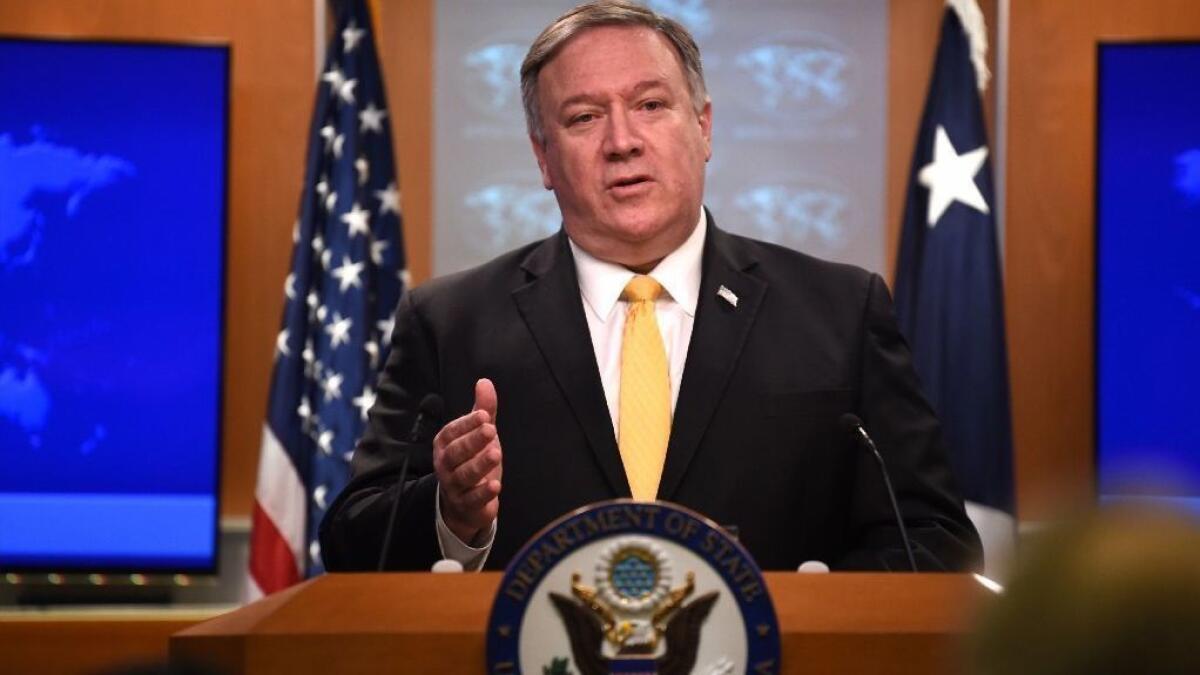Opinion: Trump just trashed an arms-control treaty with Russia. U.S. allies (sort of) support him
- Share via

Disregarding the advice of arms-control specialists (and the Los Angeles Times editorial board), President Trump on Friday followed through with his threat to pull the United States out of a landmark arms-control treaty.
Arguing that Russia had “shamelessly” violated the 1987 Intermediate-Range Nuclear Forces (INF) Treaty, Secretary of State Michael R. Pompeo said the U.S. was suspending its obligations under the treaty and would withdraw from it in six months. Pompeo held out the possibility that the agreement could be salvaged if Russia returned to “full and verifiable compliance with the treaty” by destroying missiles whose range exceeds the 500 kilometers allowed by the treaty.
Those who warned the administration against taking this step didn’t argue that Russia hadn’t violated the treaty.
Rather, they offered other arguments. One was that abrogating the treaty over this violation by Russia would free Moscow to disregard all constraints imposed by the agreement. Another was that blowing up the INF Treaty would undermine prospects for extending the New START treaty limiting strategic nuclear warheads, which expires in 2021.
Those arguments resounded again on Friday. House Speaker Nancy Pelosi issued a statement saying that “Russia’s brazen noncompliance with this treaty is deeply concerning, but discarding a key pillar of our nonproliferation security framework creates unacceptable risks.”
There was another argument against withdrawal: that it would strain relations between the U.S. and its European allies. Last year, after it became clear that Trump was likely to withdraw from the treaty, a spokeswoman for the European Union’s chief foreign-policy official called the treaty “a pillar of European security architecture” and warned against “a new arms race that would benefit no one and on the contrary would bring even more instability.”
On Friday, Pompeo emphasized that the U.S. decision had the support of the other members of NATO, an organization whose membership includes several EU nations. Indeed, NATO issued a statement affirming that unless Russia destroyed the missile system the U.S. has objected to, it “will bear sole responsibility for the end of the treaty.”
But that statement of solidarity doesn’t mean that the U.S. has a green light from Europe to follow abrogation of the treaty with the deployment of intermediate-range missiles on the continent. And it’s significant that the NATO statement, even as it supports Trump’s decision, stresses the alliance’s commitment to “effective international arms control, disarmament and nonproliferation.”
The question is whether the Trump administration shares that commitment.
Follow the Opinion section on Twitter @latimesopinion and Facebook
More to Read
A cure for the common opinion
Get thought-provoking perspectives with our weekly newsletter.
You may occasionally receive promotional content from the Los Angeles Times.










